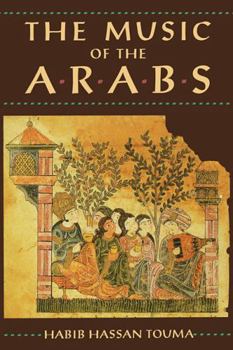The Music of the Arabs
Select Format
Select Condition 
Book Overview
The late composer and musicologist Habib Hassan Touma compiled a number of authoritative books on Arab music in his lifetime. Originally published in Germany in 1989, _The Music of the Arabs_ from Amadeus Press is the first English translation of the book, joining French and Italian editions. Dr.Touma died in 1998.
Format:Paperback
Language:English
ISBN:1574670816
ISBN13:9781574670813
Release Date:March 2003
Publisher:Globe Pequot Publishing Group Inc/Bloomsbury
Length:262 Pages
Weight:1.10 lbs.
Dimensions:0.6" x 5.9" x 9.0"
Customer Reviews
5 ratings
ARAB MUSIC IS NOT BELLY DANCE MUSIC
Published by Thriftbooks.com User , 14 years ago
While of course, music for accompanying "belly" dance is a part of arab music,neither it, nor the dreadful synthesizer based pop music of today with its heavy disco and hip hop influences, are the roots or sum of the music of the Arabs. So you see my bias. Clearly this author makes some mistakes, has his biases, and it is ridiculous he leaves out Farido, but beyond that this is still an excellent book that should maybe be called the Roots of the Music of the Arabs. If that interests you, then here you go!
Indispensable
Published by Thriftbooks.com User , 15 years ago
As you can see, this is a complex and contentious topic. If you want to get your bearings, there is simply no better introduction to the subject in English, and that's not all good news. It would be silly to expect a small book like this to cover all aspects, let alone all personalities, be they "authentic" or not. This is certainly in the spirit of the great musicologists like D'Erlanger, who wanted to save Arabic music from itself, and in opposition to the inferiority complex that created the bizarre "arabic orchestra", in which legions of musicians play a single melodic line on as many western instruments as could be dragged onto the stage. It also sheds some light on why attempts to create pieces like symphonic "oud concertos" might sound silly and contrived. At the same time, there is a touch of madness and bias to such polemics. Imagine a little book called "Music of the Europeans", and you get a taste of the problems. Touma also forgets that Western Art Music is in crisis. The old orderly image of "classical music" is failing because we are finding that there is no viable "contemporary classical music". Mozart and Beethoven were products of their economic/social context, and those norms no longer work. If you want to talk about the music we listen to, you have to include John Lennon, Andrew Lloyd Webber ... AND Farid El AlTrash. Having relied on rote oral transmission from master to student, especially defenseless against distortions for having no system of notation of its own, Arabic music has been constantly evolving (or decaying) over the centuries, and changing under the influence of foreigners. At one point Touma makes the following tragic admission: "Most Arabs today, however, whatever their level of education might be, no longer know true Arabic music." The sad thing is that the author of this book is no exception. It's as good as it gets, yet it is full of errors that reveal more than a translation (from German) problem. The reference to "Early Persian Magicians" to denote Zoroastrians in the first chapter is symptomatic. Touma then incomprehensibly uses the term "Maqam", which is a mode, a scale or tone row, to denote a Taqsim, which is an is improvisation form that USES a Maqam. The material covered is wide, and nobody will spot all the errors, but it happens that I can also see that the very important Ajam Maqam is notated incorrectly. The criticism that some reviewers level, that it arbitrarily ignores some important figures in 20th century Arabic music, is also not without basis. Farid El Altrash was not just a crooner, he did more to restore interest in the classical Taqsim and the essential Oud (lute) than anyone "modern" before him. The fact that all the Arabic TV stations now regularly broadcast high quality Taqsim music is Farid's legacy. Ignoring him completely was NOTa wise editorial decision on Touma's part. You can be sure all the other material in this book is likewise a bit stilted and peppered with little mista
Great!!
Published by Thriftbooks.com User , 16 years ago
This is simply the best introduction to Arabian music written in English and one of the best introduction to this music ever written. Informative, accessible, and comprehensive. Highly recommended!!
An excellent book
Published by Thriftbooks.com User , 18 years ago
Thanks God that the book doesn't mention Farid or Abdel Wahab, because Arabic music did exist before them, or before they changed it into Casino-like belly dancing arabesque musique rather than a decent creative music that didn't need their foreign and stupid influences such as Rumba and Tango, things that were cut and paste from the hollywood of the twenties, and that are so out of date now. This book focuses on the Arabic music as a traditional inherited music, and does an excellent job at describing it.
Best introduction I've read
Published by Thriftbooks.com User , 27 years ago
Yearning to discuss technical specifications of the oud? Want to casually mention the influence of the maqam phenomenon at your next cocktail party? Me either. That's why I bought this book instead of some dry pedantic musicological tome. (Besides, I hate cocktail parties.) Arab music is fascinating to listen to, but it's great to be able to understand what's coming out of the speakers. Touma deftly handles major aspects of the music, and provides a layman's glossary and even a transliteration of the Arabic alphabet. Out of all the books I bought, this was the only one I could understand without a degree in musicology. A fabulous and down-to-earth introduction to what is often a mysterious subject.





